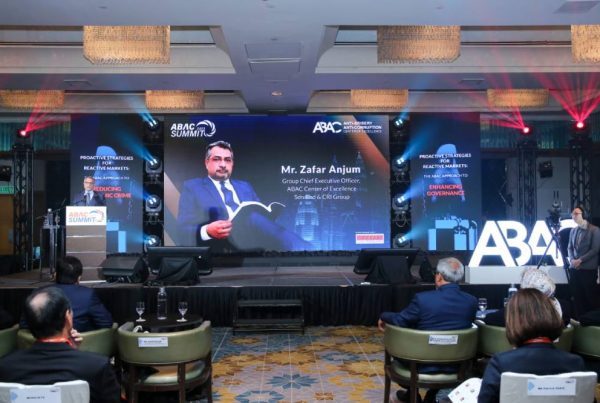In April 2021, Foreign Secretary Dominic Raab has announced the UK’s first sanctions under the new Global Anti-Corruption regime.
In his speech on 26th April, the Foreign Secretary said: “Corruption has an immensely corrosive effect on the rule of law, on trust in institutions. It slows development, it drains the wealth of poorer nations. It keeps their people trapped in poverty. It poisons the well of democracy around the world”.
The United Kingdom has an important role to play in the fight against corruption. Being the global financial centre attractive location for investment, it also makes the UK a “lightning rod for corrupt actors who seek to launder their dirty money through British banks or through businesses”. The Kingdom is aiming to become the global leader in curbing corruption and illicit finance and already has taken the following steps based on GOV.UK:
- The National Crime Agency’s International Corruption Unit and its predecessors have restrained, confiscated or returned well over a billion of assets stolen from developing countries since 2006.
- Introduced The Bribery Act 2010 that criminalises bribery, and the failure of businesses to prevent bribery from happening in the first place. In 2020, the UKBA celebrated 10 years anniversary – find out more here!
- In April 2016 the UK was the first in the G20 to establish a public register of the beneficial owners of companies and similar legal entities, with half a million companies listed now on the register.
- In 2017, the UK has adopted the ambitious five-year Anti-Corruption Strategy and established the International Anti-Corruption Coordination Centre in London, which has helped freeze over £300 million of suspected corrupt assets worldwide and led to dozens of arrests.
According to Transparency International’s Corruption Perceptions Index (CPI), those actions and our commitment to tackling corruption have seen the UK rise from a global ranking of 20th in 2010 to 11th place in 2020, out of a total of 180 countries.
The United Kingdom scores 77 out of 100 on Transparency International’s (TI) 2020 CPI, as is one of the 25 least corrupt countries across the globe. However, as we wrote earlier, it all seemed great on the surface as corporate fraud and corruption cases have been noticeable in various industries across the UK. TI reports that corrupt actors enjoy their illicit gains by “buying luxury property in the world’s most sought-after cities, like London”. Based on the article “CPI 2020: Trouble in the top 25 countries”, “While the UK (77) is the first G20 country to launch a public register of beneficial ownership, a loophole in the law allows foreign companies to purchase real estate anonymously. This is particularly problematic as research shows that over 75 per cent of properties subject to criminal investigations between 2004 and 2015 used offshore anonymous companies to hide their owners’ identities. The UK government committed to closing this loophole by introducing a register of beneficial ownership for property, but it has yet to be implemented. The necessary legislation has been subject to significant delays. In the meantime, rich businesspeople linked to autocratic regimes are allegedly purchasing property via shell companies, such as billionaire and daughter of former President of Angola, Isabel de Santos.” The new more stringent actions to curb bribery and corruption were much needed.
To discuss the situation of corporate fraud and corruption, CRI Group and its ABAC® Center of Excellence were invited this year to share the expert views in the special InDepth Feature by Financier Worldwide “Corporate fraud and corruption 2021”. In this edition, CRI Group’s CEO Zafar Anjum and ABAC®’s Scheme Manager Huma Khalid talk about how corporate fraud and corruption affect businesses not only in the UK, but across the globe, and provide solutions and insights for businesses to become better protected from corporate fraud, bribery and corruption.
Global Anti-Corruption sanctions regime
On April 26th, Foreign Secretary Dominic Raab has announced the UK’s first sanctions under the new Global Anti-Corruption sanctions regime. The following actions were announced by GOV.UK:
- Sanctions target 22 individuals involved in notorious corruption cases in Russia, South Africa, South Sudan and throughout Latin America
- Foreign Secretary vows to stop corrupt individuals using the UK as a safe haven for dirty money
- New sanctions regime stops those involved in serious corruption from entering and channelling money through the UK
> Read The Global Anti-Corruption Sanctions Regulations 2021
The UK’s first wave of sanctions under this new sanctions regime is targeting:
- “Those involved in the diversion of $230 million of Russian state property through a fraudulent tax refund scheme uncovered by Sergei Magnitsky – one of the largest tax frauds in recent Russian history
- Ajay, Atul and Rajesh Gupta and their associate Salim Essa, for their roles in serious corruption. They were at the heart of a long-running process of corruption in South Africa which caused significant damage to its economy
- Sudanese businessman Ashraf Seed Ahmed Hussein Ali, widely known as Al Cardinal, for his involvement in the misappropriation of significant amounts of state assets in one of the poorest countries in the world. This diversion of resources in collusion with South Sudanese elites has contributed to ongoing instability and conflict
- Several individuals involved in serious corruption in Latin America, including facilitating bribes to support a major drug trafficking organisation and misappropriation that has led to citizens being deprived of vital resources for development
The Global Anti-Corruption sanctions regime builds on the success of the Global Human Rights sanctions regime established in July 2020, which has resulted in the UK imposing sanctions on 78 individuals and entities involved in serious human rights violations, including from Myanmar, Belarus, China and Russia.”
The next steps?
The UK will continue to curb corruption across the world by a wide range of means, including funding the International Corruption Unit in the National Crime Agency. From 2006, the International Corruption Unit has restrained, confiscated or returned over £1.1 billion of stolen assets, stolen from developing countries.
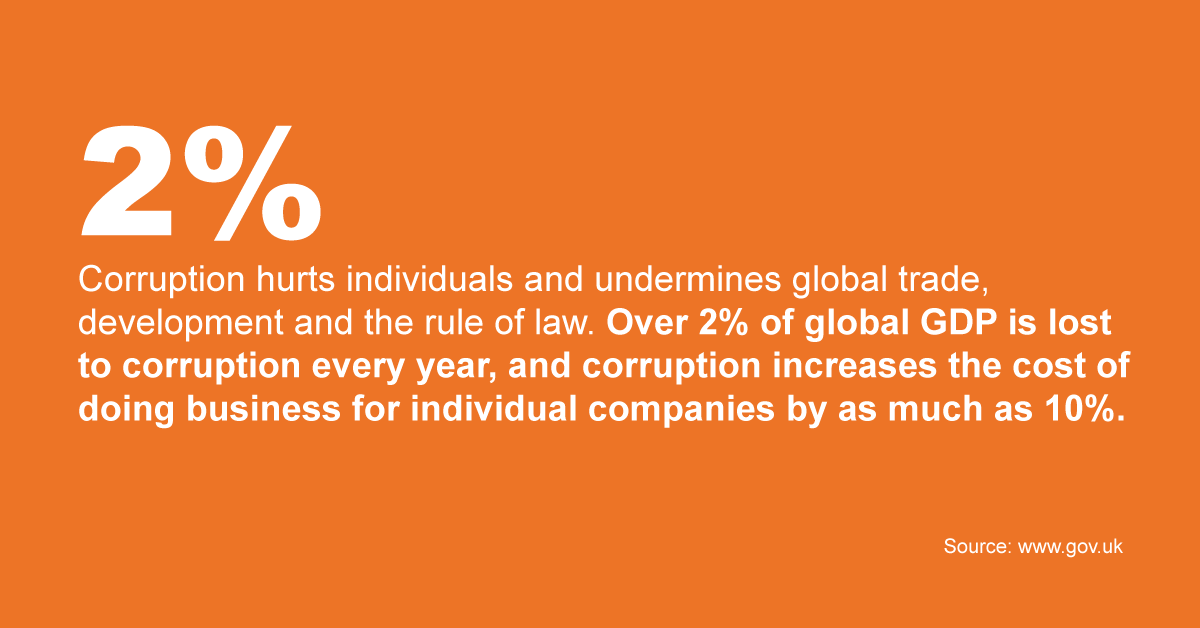
Saying ‘NO’ to corruption is not enough!
Join the fight against bribery and corruption and take actions now! To help business curb bribery and corruption more effectively, we are conducting this survey to understand how and what actions professionals take to fight bribery in their organisations and operating regions. Participate in our survey today to stand out against bribery corruption.
How to demonstrate “Adequate Procedures”?
ISO 37001 Anti-Bribery Management System is an internationally accepted standard that specifies the procedures by which an organisation should implement in preventing bribery while detecting and reporting any bribery incident that occurs. The standard requires organisations to implement these procedures on a reasonable and proportionate basis according to the type and size of the organisation, and the nature and extent of bribery risks faced. It applies to small, medium and large organisations in the public and private sector and can be implemented in any country. Though it will not provide absolute assurance that bribery will completely cease, the standard can help establish that the organisation has in place reasonable, proportionate and adequate anti-bribery procedures.
ABAC® Center of Excellence Limited is fully accredited as a Conformity Assessment Body (Certification Body) to assist your organisation in attaining ISO 37001 certification through a thorough bribery risk assessment and audit covering the entire scope of the standard The audit methodology is evidence-based, meaning any issues raised will be confirmed through adequate evidence that the ABAC® Certification team has discovered during the audit. Auditing techniques take a risk-based approach to examining your organisation’s Anti-Bribery Management System (ABMS), and the ABAC® Certification team will increase the scale of the investigation if they determine that a specific process presents on a higher risk side. Factors such as Impact, Negligence, Minor, Major, and Critical are taken into consideration during the audit.
A separate audit method is a process-based approach where the ABAC® Certification examines the organisation’s processes while considering the interaction between those processes. Finally, there is a sampling-based audit approach where ABAC® Certification incorporates an appropriate sampling plan utilising samples from different ABMS processes to conclude and support the audit findings and results.
The audit is extremely thorough in its approach, which results in accredited certification for the scope of the ISO 37001 Anti-Bribery Management System. Because of the standard’s international acceptance and the thoroughness of the audit process, such certification can provide a valuable safeguard in demonstrating an “adequate procedures” compliance defence in cases posing a liability for a company’s failure to prevent bribery. Indeed, from an FCPA perspective, certification may provide tangible evidence that a compliance program was in place at the time of the alleged bribery actions. And from a UK Bribery Act perspective, the certification could provide the company with tangible prima facie evidence presented by an accredited certification body attesting to the establishment and effectiveness of the organisation’s compliance program. Notably, per Section 17A of the Malaysian Anti-Corruption Commission, the Prime Minister’s National Anti-Corruption Plan 2019-2023 has declared ISO 37001 certification a requirement for companies operating in Malaysia.
We thought you might be interested in…
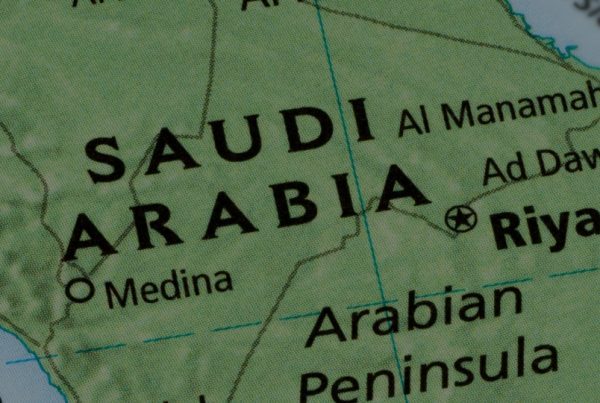
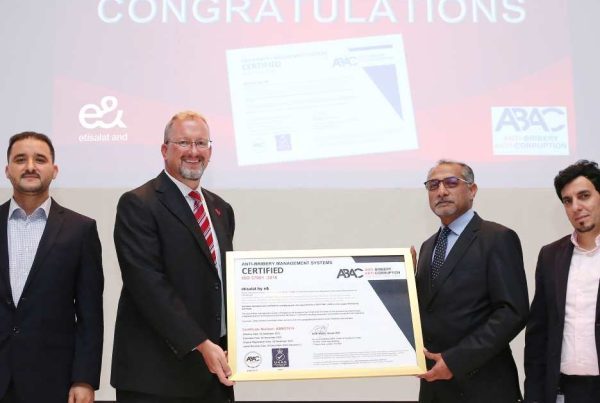
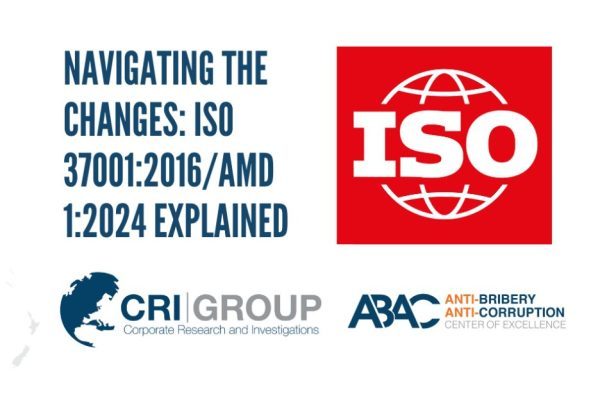
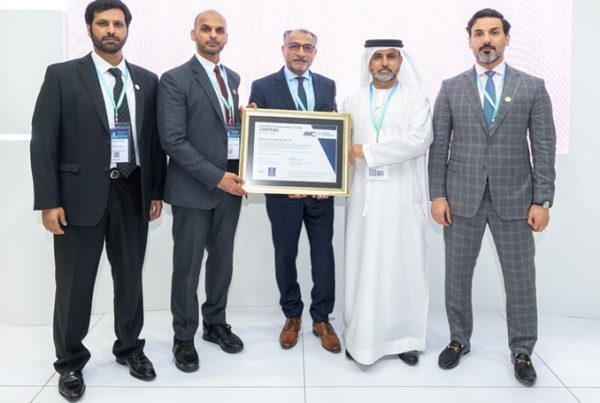
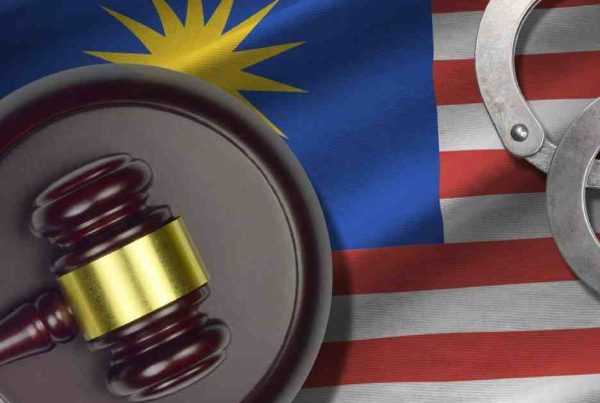
About ABAC® Center of Excellence
ABAC® Center of Excellence is an independent certification body powered by CRI Group. ABAC® offers a complete suite of services and solutions designed to educate, equip and support the world’s leading business organisations with the latest best-in-practice risk & performance assessments, systems improvement & standards certification. Find out more about ABAC®!
ABAC® programs protect your organisation from damaging litigation & safeguard your business in the global marketplace by providing certification & training in internationally recognised ISO standards, such as ISO 37001 Anti-Bribery Management Systems, ISO 37301 Compliance Management Systems and ISO 31000 Risk Management Systems.
Based in London, CRI Group works with companies across the Americas, Europe, Africa, Middle East and Asia-Pacific as a one-stop international Risk Management, Employee Background Screening, Business Intelligence, Due Diligence, Compliance Solutions and other professional Investigative Research solutions provider. We have the largest proprietary network of background-screening analysts and investigators across the Middle East and Asia. Our global presence ensures that no matter how international your operations are we have the network needed to provide you with all you need, wherever you happen to be. CRI Group also holds BS 102000:2013 and BS 7858:2012 Certifications, is an HRO certified provider and partner with Oracle. Contact CRI Group today for further information on how CRI Group can help your business.

